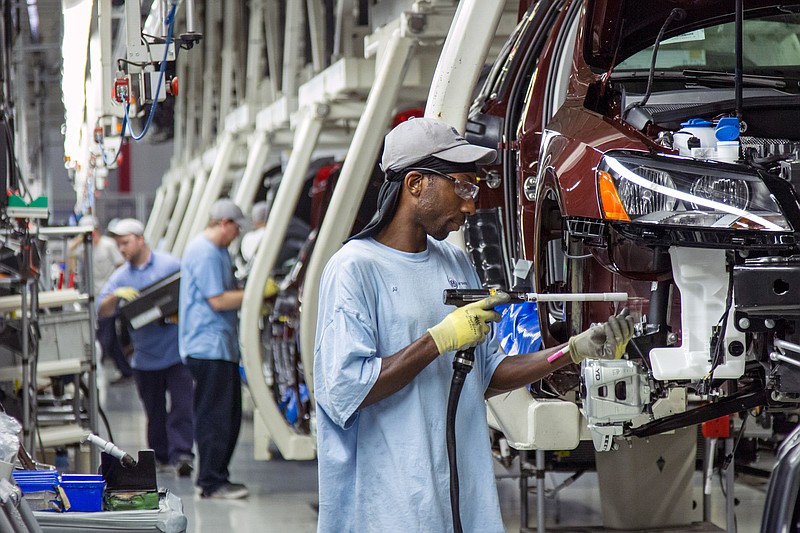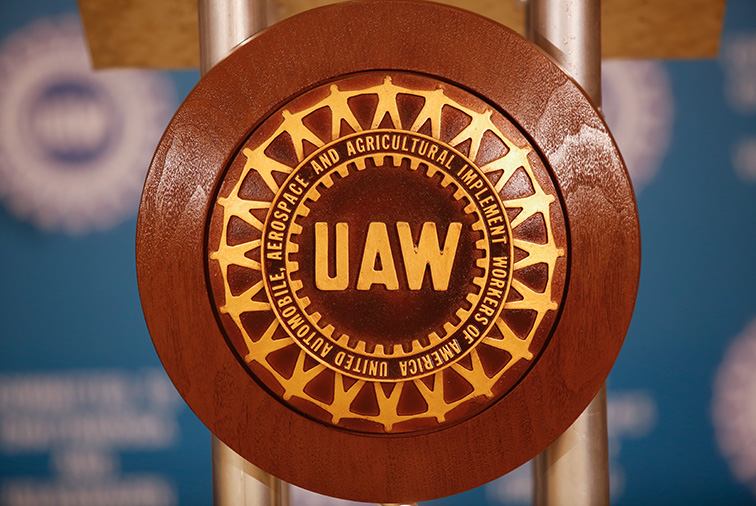Top 10 least unionized states
1. South Carolina, 2.9 percent2. North Carolina, 4.1 percent3. Georgia, 5.1 percent4. Utah, 5.2 percent5. Texas, 5.6 percent6. Arkansas, 6.4 percent7. Tennessee, 6.5 percent8.Louisiana, 6.8 percent8. Mississippi, 6.8 percent8. North Dakota, 6.8 percentLabor union membership* Alabama, 190,000 members in 2015, or 11 percent of the workforce, down by 14,000 from the previous year* Tennessee, 146,000 members in 2015, 6.5 percent of the workforce, up 19,000 members from the previous year* Georgia, 162,000 members in 2015, or 5.1 percent of the workforce, down 8,000 members from the previous yearSource U.S. Bureau of Labor
Two weeks ago, workers at the new Magna Seating International plant in Spring Hill, Tenn., voted 192-1 to be represented by the United Auto Workers.
Later this month, UAW negotiators will sit down with Magna representatives to negotiate a contract for the 230 hourly employees at the Middle Tennessee plant.
The union victory and expected new labor contract are part of a growth spurt for organized labor in Tennessee.
Although Tennessee is one of the 10 least-unionized states in the country, unions in the state added 19,000 members last year, boosting membership by nearly 15 percent, according to the U.S. Bureau of Labor Statistics.
But as workers today celebrate the Labor Day holiday that unions fought to create 122 years ago, labor unions continue to face strong headwinds. In Chattanooga, once one of the stronger unionized cities in the South, major union employers such as GE Alstom and the Tennessee Valley Authority are cutting staff and Volkswagen continues to fight efforts to organize part of its Chattanooga plant.
And despite last year's gains, Tennessee union membership is still down by more than a third since 2000. Similar declines have occurred in Georgia and Alabama.
In Chattanooga, an estimated 5.6 percent of all workers belong to labor unions, according to an analysis done by the Andrew Young School of Policy Studies at Georgia State University. Chattanooga's share of union workers is only half the national average, and most of those work in the public sector, which has limited rights to strike.
Among private-sector workers in metropolitan Chattanooga, only 2.8 percent were union members last year. Three decades ago, three times as many private-sector employees were unionized.
The sale or closing of unionized manufacturers such as Wheland Foundry, Combustion Engineering, U.S. Pipe & Foundry and Cavalier Corp., combined with the deregulation and growth on nonunion trucking companies, has dramatically shrunk organized labor's foothold in Chattanooga.
"We've got a lot of work to do, but I think you're going to see us grow after being beaten down for so long," said Billy Dycus, president of the Tennessee AFL-CIO. "We haven't done a good job of selling ourselves, reaching both political parties and explaining how a union can be good for our community and good for your community."
Dycus said unions and their members sponsor Little League teams, build Habitat for Humanity houses and contribute strongly to local United Way campaigns and other community programs.
Trade unions such as the International Brotherhood of Electrical Workers, the biggest union in Chattanooga, provide training for skilled jobs and advanced manufacturing employment. At the work site, "unions give workers a voice and a way to better contribute to a company's success" while working to boost members' pay and benefits, Dycus said.
Last year, the Bureau of Labor Statistics said the average union worker was paid an average of $980 per week, nearly 27 percent more than the $776-per-week average for nonunion workers. The AFL-CIO also says union members are more likely to have pensions, health insurance and paid vacation than their nonunion counterparts.
But at least some of that difference reflects the different makeup of jobs and cost-of-living factors. Unions tend to be stronger in manufacturing and construction industries, which pay more regardless of union representation and are more concentrated in higher-wage and more-expensive states in the North and on the West Coast.
Critics of labor unions also say better pay and benefits for union members are costly, making heavily unionized communities less attractive for new business recruitment.
"If they had their druthers, most companies would prefer to locate and operate without unions because labor contracts typically add significant fixed costs and because their work rules deny important flexibility and efficiency in operations," said Dale D. Buss, an editor for Area Development magazine, which surveys business executives and site selection consultants about the criteria used to pick where they locate.
VW vs. UAW in Chattanooga
Tennessee political leaders and others have voiced such concerns to discourage VW plant workers from joining the UAW, in one of the most high-profile labor organizing campaigns in the country. Chattanooga has the only VW assembly plant in the world that is not unionized.
In February 2014, hourly workers at VW voted 712-626 against joining the UAW after U.S. Sen. Bob Corker, Gov. Bill Haslam and other Republican leaders warned that unionizing the plant might hurt Tennessee's business recruitment and expansion.
After Volkswagen later announced a $900 million plan to build a second vehicle model in Chattanooga and add 2,000 jobs, a small group of skilled plant maintenance workers petitioned to join the UAW. The hourly maintenance employees voted 108-44 in December to be represented by UAW Local 42.
But VW objected to just a small group of employees joining a "micro union" within the plant.
"Volkswagen respects the right of all of our employees to decide the question of union representation," company spokesman Scott Wilson said last week. "This is why we disagree with the decision to separate Volkswagen maintenance and production workers."
Last Wednesday, the National Labor Relations Board said VW was violating labor law by not recognizing the results of the election and ordered the auto maker to begin negotiating a contract with the maintenance workers. The next day, Volkswagen challenged the NLRB ruling in a lawsuit filed in the U.S. Court of Appeals for the District of Columbia Circuit.
VW wants all of its hourly workers to decide on the unionization question, rather than have some production workers with a union contract and some without.
What constitutes a bargaining unit?
The NLRB said earlier this year the skilled-trades workers who maintain and repair machinery and robots at the plant "share a community of interest" in terms of qualifications, training, supervision and hours, distinct from production workers in the assembly, body weld and paint shops.
That decision draws on the board's landmark 2011 ruling in favor of certified nursing assistants at Specialty Healthcare and Rehabilitation Center of Mobile, Ala., that paved the way for the formation of smaller employee unions within a work site. In that case, the nurses sought to create a 53-person bargaining unit represented by the United Steelworkers, to the exclusion of other workers at the home. That ruling was upheld by the 6th U.S. Circuit Court of Appeals in 2013.
Steve Cochran, a skilled maintenance worker who is vice president of UAW Local 42, said Volkswagen already has different union and bargaining groups at its other plants around the world, "and it's time for Volkswagen to recognize us and begin bargaining for a contract."
Cochran pointed to the Magna vote in Spring Hill where the company and union leaders began almost immediately preparing for contract negotiations once the NLRB certified the election results.
"The employees in our plant know they need someone to represent them, to give them more of a voice and to make sure that the workplace is fair to everyone," Cochran said. "We have an overwhelming majority of people who are members of our local union."
Even though it is not now negotiating a contract or charging membership dues, Local 42 has signed up hundreds of VW workers in Chattanooga.
Political influences
Cochran blamed the UAW's initial defeat two years ago on "outside politicians and business leaders" who urged VW workers to reject the union and raised the specter of economic disaster.
"There would have been a different outcome if there weren't threats made by outside people claiming 'you won't get your SUV or new investments in the plant if we vote the union in,' and that scared a lot of employees away from voting for the union," Cochran said. "It's a shame that we have outside politicians that want to get involved in our business."
But Mark Nix, president of the National Right to Work Foundation, said the UAW claims about undue interference from Haslam and Corker "is hilarious," since he said labor-backed politicians regularly praise labor unions and advocate on their behalf to the public and to government regulators and officials.
"We have politicians every day talking about how you need to be in this union and criticizing employers who don't want a union," Mix said. "This [2014 election] was one of the few times when politicians had the courage to stand up and say, 'you know, we ought to think about this before we dive into the deep end of the pool on this thing.'"
Mix said companies are choosing to locate in right-to-work states, where employees in a unionized shop don't have to join the union and union presence is generally lower.
"They may not want to tell you outright that it is an important criteria, but it is," Mix said. "You just look at where companies are locating."
But Cochran noted no political or business groups urged employees at many Middle Tennessee plants to join the UAW, which has thousands of members in and around Spring Hill, where General Motors makes its Cadillac XT5 and the GMC Acadia models.
"This is an exciting time for Magna members and the UAW is looking forward to working with Magna and members in the plant to create the modern, efficient, quality environment for their customers," said Ray Curry, director of UAW Region 8, after the Aug. 23 Magna vote.
UAW Secretary-Treasurer Gary Casteel called VW's continuing challenge of the Chattanooga bargaining unit "nothing more than a stall tactic to try to delay the inevitable."
"It's overdue time for the company to meet the local union at the bargaining table," he said.
IG Metall, the union that represents Volkswagen hourly workers in Germany, has urged VW to recognize the UAW in Chattanooga.
The UAW has been thwarted for decades in its efforts to organize workers at foreign-owned auto plants in the South. The auto workers union has twice lost organizing elections at Tennessee's biggest automotive manufacturer, the Nissan plant in Smyrna, Tenn. The UAW also is trying to organize the Daimler- Mercedes plant in Alabama and the Nissan plant in Mississippi.
The Associated Press contributed to this report.
Contact staff writer Dave Flessner at dfless ner@timesfreepress.com or at 423-757-6340

